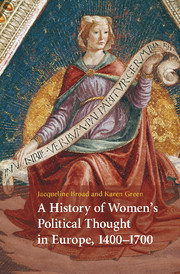Book contents
- Frontmatter
- Contents
- Preface
- Introduction
- 1 Christine de Pizan
- 2 Women of the Italian Renaissance
- 3 From Anne de Beaujeu to Marguerite de Navarre
- 4 Queen Elizabeth I of England
- 5 From the Reformation to Marie le Jars de Gournay
- 6 Women of the English civil war era
- 7 Quaker women
- 8 The Fronde and Madeleine de Scudéry
- 9 Margaret Cavendish, Duchess of Newcastle
- 10 Women of the Glorious Revolution
- 11 Women of late seventeenth-century France
- 12 Mary Astell
- Conclusion
- Bibliography
- Index
Conclusion
Published online by Cambridge University Press: 02 July 2009
- Frontmatter
- Contents
- Preface
- Introduction
- 1 Christine de Pizan
- 2 Women of the Italian Renaissance
- 3 From Anne de Beaujeu to Marguerite de Navarre
- 4 Queen Elizabeth I of England
- 5 From the Reformation to Marie le Jars de Gournay
- 6 Women of the English civil war era
- 7 Quaker women
- 8 The Fronde and Madeleine de Scudéry
- 9 Margaret Cavendish, Duchess of Newcastle
- 10 Women of the Glorious Revolution
- 11 Women of late seventeenth-century France
- 12 Mary Astell
- Conclusion
- Bibliography
- Index
Summary
In 1991, Margaret King concluded her ground-breaking work on Renaissance women with the following bleak assessment:
When Renaissance women confronted the predicaments in which women found themselves, their solution was not to change society, irreparably dominated by male concerns, but to escape it. All three of the feminists considered in these last pages [Christine de Pizan, Moderata Fonte, Mary Astell] were social conservatives. They challenged the tyranny of men but not the tyranny of class or potentate. Within the structures their critique left undisturbed there was no place for women: no role for women in cities where only men could be citizens or kings. Until those ancient structures fell to male assault in the name of civil rights and natural law in the revolutions of the late eighteenth century, no truly modern feminist claims could be made.
In this study, we have offered a more positive account of the place of women in the development of European political ideas. It is true, as King notes, that many women writers were socially conservative. A good number were prompted to write by their recent experiences of political turmoil, civil war, and social upheaval. They emphasise the need for submission to political authority, seeing it as necessary for the preservation of political stability and peace. And while some criticise the tyranny of marriage, others take the importance of political subjection so far as to argue for the legitimacy of a man's right to govern his wife.
- Type
- Chapter
- Information
- A History of Women's Political Thought in Europe, 1400–1700 , pp. 288 - 292Publisher: Cambridge University PressPrint publication year: 2009



